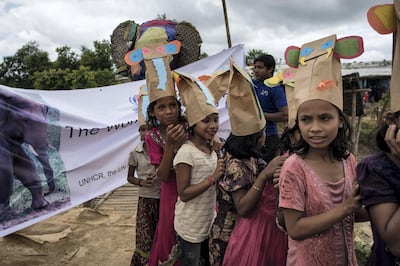It was once labelled the world's fastest growing refugee crisis. A year on, the plight of the Rohingya is becoming intractable.
Over three months starting in August last year, almost 725,000 Rohingya arrived in Bangladesh from Myanmar, leading the UN's International Organisation for Migration to describe the exodus as "unprecedented in terms of volume and speed".
Efforts since to repatriate the refugees have failed to gain traction. The Myanmar government is yet to welcome home a single refugee from Bangladesh.
And so far, the international community has been unwilling to apply significant pressure to compel its co-operation. Despite vigorous demands from the Bangladesh government that the Rohingya must return home, observers – and refugees themselves – increasingly fear their exile may be permanent.
The difficulties for those exiled is clearest on the border between Myanmar and Bangladesh at Tombru checkpoint, about 45 kilometres from Cox's Bazar. Here, about 5,000 Rohingya refugees live in no man’s land between the Myanmar border fence and the muddy creek which delineates the international border. The refugees say they fear if they enter Bangladesh they will never be able to return home. Some can see their former lands from the shanties they now have to live in.
But the Myanmar government does not want them here. Hilltop military outposts sit a stone's throw from the camp.

As recently as a month ago, its soldiers fired into the camp in an attempt to drive them off the land. At times loudspeakers have broadcast warnings that anyone who left Myanmar illegally – by crossing the border – will be prosecuted if they attempt to return.
"The world knows that we’ve been here for a year now," said Arif, a 42-year-old Rohingya who goes by one name only.
"When will be allowed to return to our motherland?" he asked in the presence of a sympathetic Bangladeshi border guard.
The Rohingya are adamant of their desire to return to home. But say they won't do so without guarantees. They want citizenship rights, recognition of Rohingya as an official ethnic group of Myanmar, and some kind of international protection.
Some of those demands may have to wait.
"We think both sides will have to compromise," one high-level Bangladeshi government official said, on condition of anonymity because they were not authorised to speak to the media.
Already struggling in an election year to govern the world's most densely populated country, the Bangladesh cabinet says it cannot bear the burden of hosting the Rohingya community long-term.
"We would like them to go home as soon as possible," the official added.
In November last year, Bangladesh signed a memorandum of understanding with Myanmar that repatriation should be voluntary, dignified and safe. But the agreement lays out no timeline, and so far, no refugees have gone home.
The problem, Bangladeshi officials suggest privately, is Myanmar's intransigence.
The first step before repatriation, according to the document that was signed, would be verification of the identities of the forcibly displaced Myanmar nationals.

In February, Bangladesh provided the first tranche of 8,000 names to Myanmar. Six months on, Myanmar has only verified a little more than 2,000 of those names. The numbers are a drop in the ocean.
The UN's refugee agency has counted 891,233 Rohingya refugees in Bangladesh.
"You can imagine how long it would take," the official said, his voice filled with resignation.
_____________
Read more of Campbell MacDiarmid's reporting from Bangladesh:
[ 'I saw them with our women, doing whatever they wanted' ]
For the Rohingya, now at least, anger stops short of militancy
Rohingya find their voice in exile but not an audience
[ How the exiled Rohingya and endangered elephants learnt to coexist ]
_____________
Without leverage and keen to maintain good relations, Bangladesh says it is up to the international community to encourage Myanmar to accept the return of Rohingya. Global pressure is the only thing Myanmar responds to, suggested another Bangladesh government official.
But it is not an issue that has uniform agreement. China and Russia have opposed UN resolutions on Myanmar.
In contrast, the US last week announced targeted sanctions against Myanmar military leaders it said were responsible for "violent campaigns against ethnic minority communities across Burma, including ethnic cleansing, massacres, sexual assault, extrajudicial killings, and other serious human rights abuses".
Sigal Mandelker, under secretary for Terrorism and Financial Intelligence at the US Treasury, said: "There must be justice for the victims and those who work to uncover these atrocities, with those responsible held to account for these abhorrent crimes. The US government is committed to ensuring that Burmese military units and leaders reckon with and put a stop to these brutal acts."
In the coming weeks, the International Criminal Court is expected to decide if its jurisdiction in Bangladesh is sufficient to hear cases involving forced deportation. A UN fact finding mission and the US State Department are also both expected to publish reports on the violence in Rakhine state.
But there is little sign so far that the threat of sanctions or promises of development aid, such as a recently proposed $100 million World Bank loan to benefit Rakhine, will soften Myanmar’s position towards the Rohingya.
The Myanmar government has ostensibly committed to the repatriation of Rohingya refugees by signing memorandums with Bangladesh and the UN. But after carrying out what the UN described as a "text book case of ethnic cleansing", many doubt the government's sincerity.

Myanmar's army recently published a 117-page book outlining its narrative for the Rakhine violence. Authored by the army’s "directorate of public relations and psychological warfare", the report denied genocide and rape by the nation's forces, and argued that Bengali invaders had attempted to form an independent "Arkistan" in Rakhine. "Despite living among peacocks, crows cannot become peacocks," the report concluded.
Such an outlook adds to pessimism.
"People are making comparisons to the Palestinians,” said Liam Mahony, an expert in civil protection who has authored UN reports on the Rohingya, adding that they "might be refugees for generations".
Already, NGOs and the UN anticipate and are planning for a long response to the crisis, though in deference to the Bangladesh government's hope that the Rohingya will be repatriated soon, most are cautious in talking about the specifics.
"They struggle with that language of medium-term," said Frank Kennedy, the operations manager for the International Federation of Red Cross and Red Crescent Societies in Bangladesh, referring to the government's reluctance to approve the construction of permanent structures in the camps.
"But certainly we can discuss safer shelter, all social facilities can be longer term… but for the individual houses, the government is still reluctant."
In another sign of how long the refuges could be in Bangladesh, zoologists from the International Union for the Conservation of Nature are concerned enough about the long-term survival of Bangladesh's endangered Asian elephants that they are lobbying for the construction of animal migration corridors through the camp.
Increasingly, the Rohingya themselves fear the camp will be their home, interminably.
"My grandfather sought peace in Myanmar but he didn’t find it before he died. My father too," said Mohammed Serus, a 33-year-old block leader in the camp. "Now we are here seeking a peaceful place to live. I think we will all die looking for peace."





